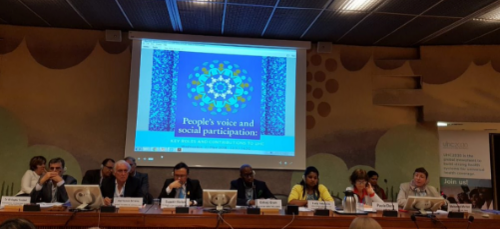UHC2030 hosted its annual UHC Day parliamentarian town hall to...
12 June 2018
A side event at World Health Assembly 71, Geneva, Switzerland.

“People must have a strong voice for UHC, yet effective mechanisms for participation are often missing in countries,” said Dr Souwmya Swaminathan, Deputy Director General of the World Health Organization.
She was speaking as she opened the 71st World Health Assembly (WHA) side event in May 2018 on ‘People’s voice and social participation: key roles and contributions to UHC’. The event was co-sponsored by Iran, Thailand and Chile and co-organised by WHO, UHC2030 and the UHC2030 Civil Society Engagement Mechanism.
Heralded, “The most important agenda during the WHA” by Dr Githinji Gitahi, Global CEO and Director General, AMREF Health Africa Group and Co-chair of the UHC2030 Steering Committee, the event highlighted how participatory governance platforms such as National Health Assemblies are at the heart of the UHC movement.
Dr Hadi Ayazi, Deputy Minister for Social Affairs, Iran, kicked off the panel discussion by outlining the importance of the social participation agenda. The screening of a video highlighted the first Iranian National Health Assembly launched in 2017. Speakers from Iran, Thailand, Tunisia, Chile and France presented the complexity, challenges and achievements of their social participation platforms: the National Health Assembly, Societal Dialogue for Health, or Etats Généraux de la Santé.
Dr Farshad, Director General of Social Affairs, Ministry of Health in Iran eloquently described the complexities around the diversity of needs within and across Iranian provinces, requiring stronger linkages between local, sub-national and national participatory processes. This was echoed by Dr Sirilak, 5th President, National Health Assembly, Thailand who recounted ongoing Thai efforts to build capacity for local and provincial health assemblies. He emphasised the principles of co-design, co-delivery and co-benefit stating that, “Social participation is both a social design and a mindset change”.
Dr Ben Said, Ministry of Health, Tunisia spoke frankly about establishing societal dialogue in 2012 within the tense post-revolution context of the country. Despite widespread mistrust and political instability, the programme has managed to bring together Tunisians from all walks of life to debate and find consensus on critical health sector issues.
In Chile, Paula Daza, Undersecretary of Public Health Chile, emphasized the importance of legal frameworks to anchor participation in health sector decision-making. Professor Delfraissy, Président du Comité consultatif national d’éthique, explained how the Etats Généraux de la Bioethique in France is independent and neutral from government, but plays a pivotal role in shaping not only policy but also public health laws. This recently concluded large-scale public consultation focused on bioethical debates such as the end of life.
Faniry Hantarinivo (civil society representative, Madagascar) and Githinji Gitahi (AMREF) spoke passionately about the importance of civil society participation to bring the voice of people into UHC debates. Hantarinivo raised the need for governments to authorise civil society to speak on behalf of people and the potential for aggressive, unconstructive engagement as key challenges for CSOs. “Investing in people’s voice and social participation is the most important investment we can make for achieving UHC, let it not be tokenism!”said Gitahi.
The WHA side event ended with the announcement of a new multi-stakeholder network focusing on participatory governance. The network will facilitate learning and exchange on strategies and experiences for strengthening social participation and will be hosted under the Health Systems Governance Collaborative.
WHO Assistant Director General Naoko Yamamoto and Director Agnes Soucat also launched a new UHC data portal, bringing data to the fingertips of a range of stakeholders through a user-friendly platform. Livestreaming of the session is available through the UHC Day Facebook page.
More UHC2030 News
A global health financing emergency threatens progress toward...
UHC2030 at HSR2024: Advancing equity and inclusion in health systems through civil society knowledge
UHC2030, in collaboration with the SUPPORT-SYSTEMS research...
